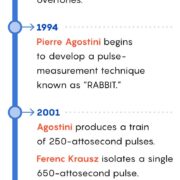How Many Microbes Does It Take to Make You Sick?
Exposure to a virus isn’t an all-or-nothing proposition. The concept of “infectious dose” suggests there are simple ways to stay safer from harm. ..
Exposure to a virus isn’t an all-or-nothing proposition. The concept of “infectious dose” suggests there are simple ways to stay safer from harm. ..
The galaxy's stars keep a record of its history. By reading those stories, astronomers are learning more about how the Milky Way came to be—and about ..
Giant black holes were supposed to be bit players in the early cosmic story. But James Webb Space Telescope observations are finding an unexpected abundance ..
Mathematical proofs based on a technique called diagonalization can be relentlessly contrarian, but they help reveal the limits of algorithms. ..

A five-year “adversarial collaboration” of scientists led to a stagy showdown in front of an audience. It crowned no winners—but it’s still progress. ..
The preferred “handedness” of biomolecules could have emerged from interactions between electrons and magnetic surfaces on primordial Earth, new research ..

The development of attosecond pulses of light allowed researchers to explore the frame-by-frame movement of electrons. ..
Do fruit flies remember their larval lives? To find out, scientists made the neurons inside larvae glow, then tracked how they reshuffled as they formed ..
In some subterranean aquifers, cells have a chemical trick for making oxygen. It offers new insight into how life survives deep underground on Earth—and ..
A deceptively simple math proposition known as the Kakeya conjecture underpins a tower of other questions in physics, number theory, and harmonic analysis. ..